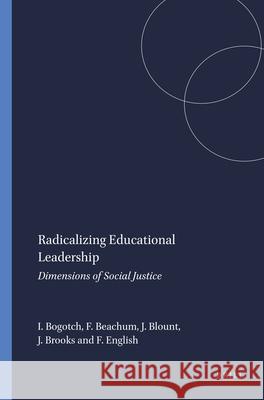Radicalizing Educational Leadership : Dimensions of Social Justice » książka
Radicalizing Educational Leadership : Dimensions of Social Justice
ISBN-13: 9789087904142 / Angielski / Miękka / 2008 / 192 str.
What you will find inside this provocative text:It should come as no surprise, as the collection of papers in this bookshow that we are up against it. Killing those we despise has becomenormative in the political minds of both the powerful and themarginalised. Framing those who are weakest as the architects of theirown disgusting state . it has become commonsense in all societies, richand poor.. Any counter-hegemonic project that seeks to rethink socialjustice and reframe educational leadership is, without question,confronting the enormous power of ordinariness, the commonsense aboutpower, inequality and violence.Jonathan JansenBy virtue of an institutionalized hegemony, the formal scales of socialjustice are informally tipped in favor of the "haves," leaving the"have-nots" at a distinct disadvantage, and often powerless anddefenseless to effect change for themselves or others. How do thesecritical perspectives change our vision of public schools and ofeducational leadership? ..Suddenly, new dynamics emerge: race matters,gender matters, sexual orientation matters, ethnicity matters, classmatters, power matters, money matters, agency matters, etc. Jeffrey BrooksHistorical research is one important way that individuals can heightentheir awareness of their own conditions. It can inspire understandingthat compels social justice leadership on account of ones status. Itcan assist potential allies in learning how their own lived experiencesof oppression might translate to persons experiencing subjugation alongother social dimensions. It can accomplish these ends by provoking us toask better questions, to understand larger patterns more deeply, and tofind inspiration in the infinitely varied stories of human frailty andcourage.Jackie BlountTo illustrate social injustice we have to look backwards. But ourgraduates are not going to work in the past. So it isnt enough to workto undo socially unjust practices .. The more complex questionsurrounding making social justice a thematic anchor and connector of aneducational leadership program is the requirement to create within atheoretical framework in which the effects of a curriculum can beempirically assessed, and which can serve as an holistic and heuristicmodel by which graduate students can engage in a gestalt view/approachto leading schools and school systems in very different directions thanbefore.Fenwick English











